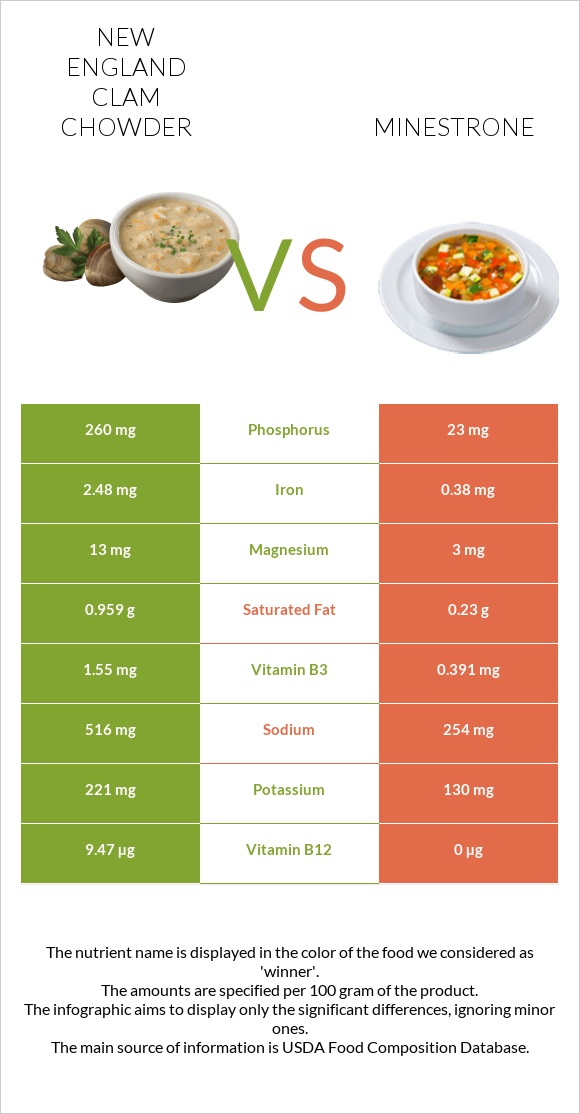New England Clam Chowder vs. Minestrone — In-Depth Nutrition Comparison
Compare
Significant differences between new England Clam Chowder and minestrone
- New England Clam Chowder is richer in vitamin B12, phosphorus, iron, copper, vitamin B2, vitamin B1, and vitamin B3, while minestrone is higher in vitamin A.
- New England Clam Chowder covers your daily vitamin B12 needs 395% more than minestrone.
- New England Clam Chowder has 11 times more phosphorus than minestrone. New England Clam Chowder has 260mg of phosphorus, while minestrone has 23mg.
- Minestrone is lower in saturated fat.
Specific food types used in this comparison are Soup, clam chowder, new england, canned, condensed and Soup, minestrone, canned, prepared with equal volume water.
Infographic

Infographic link
Mineral Comparison
Mineral comparison score is based on the number of minerals by which one or the other food is richer. The "coverage" charts below show how much of the daily needs can be covered by 300 grams of the food.
| Contains more MagnesiumMagnesium | +333.3% |
| Contains more CalciumCalcium | +14.3% |
| Contains more PotassiumPotassium | +70% |
| Contains more IronIron | +552.6% |
| Contains more CopperCopper | +368.6% |
| Contains more ZincZinc | +19.4% |
| Contains more PhosphorusPhosphorus | +1030.4% |
| Contains more SeleniumSelenium | +∞% |
| Contains less SodiumSodium | -50.8% |
Vitamin Comparison
Vitamin comparison score is based on the number of vitamins by which one or the other food is richer. The "coverage" charts below show how much of the daily needs can be covered by 300 grams of the food.
| Contains more Vitamin CVitamin C | +720% |
| Contains more Vitamin EVitamin E | +∞% |
| Contains more Vitamin B1Vitamin B1 | +468.2% |
| Contains more Vitamin B2Vitamin B2 | +816.7% |
| Contains more Vitamin B3Vitamin B3 | +296.4% |
| Contains more Vitamin B5Vitamin B5 | +65% |
| Contains more Vitamin B6Vitamin B6 | +153.7% |
| Contains more Vitamin B12Vitamin B12 | +∞% |
| Contains more Vitamin KVitamin K | +∞% |
| Contains more Vitamin AVitamin A | +188.2% |
All nutrients comparison - raw data values
| Nutrient |  |
 |
DV% diff. |
| Vitamin B12 | 9.47µg | 0µg | 395% |
| Phosphorus | 260mg | 23mg | 34% |
| Iron | 2.48mg | 0.38mg | 26% |
| Copper | 0.239mg | 0.051mg | 21% |
| Sodium | 516mg | 254mg | 11% |
| Selenium | 6.3µg | 11% | |
| Vitamin B2 | 0.165mg | 0.018mg | 11% |
| Vitamin B1 | 0.125mg | 0.022mg | 9% |
| Vitamin B3 | 1.55mg | 0.391mg | 7% |
| Vitamin B6 | 0.104mg | 0.041mg | 5% |
| Vitamin C | 4.1mg | 0.5mg | 4% |
| Vitamin A | 17µg | 49µg | 4% |
| Protein | 3.17g | 1.77g | 3% |
| Potassium | 221mg | 130mg | 3% |
| Vitamin E | 0.42mg | 3% | |
| Saturated fat | 0.959g | 0.23g | 3% |
| Polyunsaturated fat | 0.959g | 0.46g | 3% |
| Calories | 72kcal | 34kcal | 2% |
| Fats | 2.06g | 1.04g | 2% |
| Carbs | 10.32g | 4.66g | 2% |
| Cholesterol | 6mg | 1mg | 2% |
| Magnesium | 13mg | 3mg | 2% |
| Vitamin B5 | 0.231mg | 0.14mg | 2% |
| Fiber | 0.7g | 0.4g | 1% |
| Zinc | 0.37mg | 0.31mg | 1% |
| Manganese | 0.165mg | 0.152mg | 1% |
| Vitamin K | 0.8µg | 1% | |
| Choline | 6.9mg | 1% | |
| Monounsaturated fat | 0g | 0.29g | 1% |
| Net carbs | 9.62g | 4.26g | N/A |
| Calcium | 16mg | 14mg | 0% |
| Sugar | 0.38g | N/A | |
| Folate | 14µg | 15µg | 0% |
| Trans fat | 0.013g | N/A | |
| Tryptophan | 0.013mg | 0% | |
| Threonine | 0.043mg | 0% | |
| Isoleucine | 0.054mg | 0% | |
| Leucine | 0.098mg | 0% | |
| Lysine | 0.076mg | 0% | |
| Methionine | 0.018mg | 0% | |
| Phenylalanine | 0.064mg | 0% | |
| Valine | 0.074mg | 0% | |
| Histidine | 0.03mg | 0% | |
| Omega-3 - EPA | 0.01g | 0g | N/A |
| Omega-3 - DHA | 0.011g | 0g | N/A |
| Omega-3 - DPA | 0.008g | 0g | N/A |
Macronutrient Comparison
Macronutrient breakdown side-by-side comparison
Protein:
3.17 g
Fats:
2.06 g
Carbs:
10.32 g
Water:
81.49 g
Other:
2.96 g
Protein:
1.77 g
Fats:
1.04 g
Carbs:
4.66 g
Water:
91.33 g
Other:
1.2 g
| Contains more ProteinProtein | +79.1% |
| Contains more FatsFats | +98.1% |
| Contains more CarbsCarbs | +121.5% |
| Contains more OtherOther | +146.7% |
| Contains more WaterWater | +12.1% |
Fat Type Comparison
Fat type breakdown side-by-side comparison
Saturated fat:
Sat. Fat
0.959 g
Monounsaturated fat:
Mono. Fat
0 g
Polyunsaturated fat:
Poly. Fat
0.959 g
Saturated fat:
Sat. Fat
0.23 g
Monounsaturated fat:
Mono. Fat
0.29 g
Polyunsaturated fat:
Poly. Fat
0.46 g
| Contains more Poly. FatPolyunsaturated fat | +108.5% |
| Contains less Sat. FatSaturated fat | -76% |
| Contains more Mono. FatMonounsaturated fat | +∞% |





